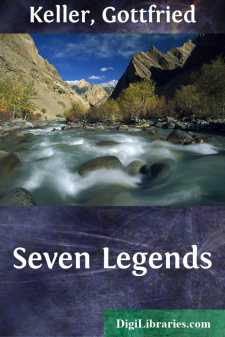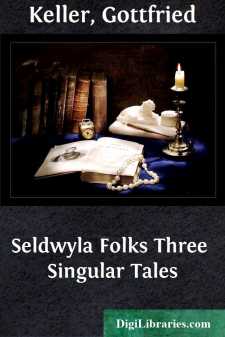Categories
- Antiques & Collectibles 13
- Architecture 36
- Art 48
- Bibles 22
- Biography & Autobiography 813
- Body, Mind & Spirit 142
- Business & Economics 28
- Children's Books 15
- Children's Fiction 12
- Computers 4
- Cooking 94
- Crafts & Hobbies 4
- Drama 346
- Education 46
- Family & Relationships 57
- Fiction 11828
- Games 19
- Gardening 17
- Health & Fitness 34
- History 1377
- House & Home 1
- Humor 147
- Juvenile Fiction 1873
- Juvenile Nonfiction 202
- Language Arts & Disciplines 88
- Law 16
- Literary Collections 686
- Literary Criticism 179
- Mathematics 13
- Medical 41
- Music 40
- Nature 179
- Non-Classifiable 1768
- Performing Arts 7
- Periodicals 1453
- Philosophy 64
- Photography 2
- Poetry 896
- Political Science 203
- Psychology 42
- Reference 154
- Religion 513
- Science 126
- Self-Help 84
- Social Science 81
- Sports & Recreation 34
- Study Aids 3
- Technology & Engineering 59
- Transportation 23
- Travel 463
- True Crime 29
Seven Legends
by: Gottfried Keller
Description:
Excerpt
Gottfried Keller, the greatest German narrative writer of recent times, was born in a suburb of Zurich on 19th July, 1819. The life of this remarkable man suggests comparisons with novels of development, such as Goethe taught him to write: from the romantic confusion of youthful dilettantism he brought himself, by strict self-discipline, to take his place in everyday social life. Left, together with his mother and sister, in poverty by a hard-working but unsuccessful father, the child dreamed away the first years of his development, and the youth was still a stranger to the world of reality when, with the aid of some friends in his native place, he went as an art-student to Munich. There, after a promising start, he sank into hopeless lethargy, which continued even after his return home. Prudent helpers then took the half painter, half poet, once more in hand, recognizing that his deficiency consisted in imperfect education and knowledge of the world. He went to study at Heidelberg (1848-50), and received an important stimulus from the well-known literary historian Hettner; thence he proceeded to Berlin (1850-55), where Varnhagen von Ense, the admirer of Goethe and husband of the prophetess Rahel, made him welcome. Here the germs of his most important works awoke within him. He had already, at an early age, published poems, which showed the influence of the revolutionary Tendenzlyrik; now there appeared the romantic autobiographical novel "Green Henry" (1854-5) which he afterwards recast in very characteristic fashion (1879-80). This was followed in 1856 by the first part of the charming, fantastically instructive tales, "Seldwyla People" (the second part, 1874). In spite of praise from many competent judges, success did not come immediately. Keller once more sat at home a dreamer, although now in intellectual correspondence with the best minds; still, it was a bold resolution when, in 1861, the writer, who had never followed any definite avocation, was chosen by his canton as Staatsschreiber, or Secretary to the Canton, and an important and well remunerated office was entrusted to an untried man. However, he proved a thorough success, and felt the acceptance of the post a deliverance from the occupation of "writing-man" so much despised by the Romantics. He filled this office for seventeen years (till 1878); a period during which his imaginative productivity unavoidably slackened. Then when, with the well merited recognition of the authorities, he had retired into private life, or had begun to prepare for retiral, there appeared, in addition to a noble volume of poems, the collection of stories, "Zurich Tales" (1877), the cycle of stories in novel-form, "The Epigram" (1882), and the novel, "Martin Salander" (1886), which continued the p?dagogic purpose of his earlier writings in almost too pronounced a fashion. Meanwhile Keller's reputation had at last been established, a consummation to which the zealous endeavours of writers and critics, such as Fr. Th. Vischer, Berthold Auerbach and Theodor Storm, had contributed in no small degree. His seventieth birthday was celebrated with affectionate interest. But the writer, who lived with his eccentric old sister in deadening domestic loneliness, and whom evenings with good friends in an inn could not compensate for the total lack of comforts, had early turned old and ailing; although any great question always found him armed and at his post. He died 15th July, 1890.
None of Gottfried Keller's works seems better suited to secure him admirers among foreign readers than the charming collection of the "Seven Legends." True, it offers peculiar difficulties to the translator, since it afforded Keller an opportunity, such as he met with nowhere else, of indulging the (for him) convenient fondness for very individual modes of expression. At the same time, these little, highly finished works of art imposed a check on his unbounded passion for fabulizing, and are not so likely to bewilder the foreign reader by sheer overabundance of invention as, say, "Seldwyla People," or even the inexhaustible "Green Henry." Yet even they shew his wealth, and that to an astonishing degree.
In his preface to this little masterpiece of his fiction, Gottfried Keller very justifiably draws attention to "the traces of an older and more profane art of fiction" which are to be found in the old Legends. No doubt their primary purpose was edification; but at the same time psychological interest in the famous saints had to be gratified, and mere human curiosity was eager to hear tales of wonder. Very special interest was devoted to "conversion," that inward process which transforms a dweller in the "world" into a citizen of the heavenly city. The history of the conversion of the apostle St. Paul had already indicated its course, along which, still earlier, among Christ's own parables, that of the Prodigal Son runs. After long-continued contempt of the "priestly lie-gends," Herder brought this religious fiction once more to the light of day; but delight in this popular form of story-telling was his immediate motive for presenting a few of them in a modern shape. The Lutheran preacher Kosegarten, however, when he followed with whole volumes of retold legends, was largely influenced by interest in their matter. Romanticism went into ecstasies over their childish tone and their believing spirit, as it had done over folk-songs and chap-books. Kosegarten's book fell into Keller's hands in 1854, when he was seeking subjects for his collection of stories "The Epigram"; but he allowed his scheme of modern legends to drop for the time being. It was not until 1871, when a publisher asked him for manuscript, that he returned to his happy thought and speedily put it into execution. The little volume appeared in 1872, and had a great success, both with the general public and with the foremost German critics of the day, such as Ferdinand Kurnberger and Wilhelm Scherer.
Even from this sketch of its origin, the fact emerges that the "Kulturkampf" mood of those years had little or nothing to do with this little work, as was readily acknowledged, even by the Liberal Catholics Kurnberger and Scherer. Keller had absolutely no intention of caricaturing the Catholic adoration of saints, like Wilhelm Busch, for example, in his "St. Antony" (1870). On the contrary, when sometimes he turns the faces of the figures of the Church Legends "to another quarter of the heavens than that towards which they looked in their extant forms," this positive confession is the important thing to his mind; for the great Swiss writer has no more intention of denying a p?dagogic purpose here than anywhere else in his epic work....



